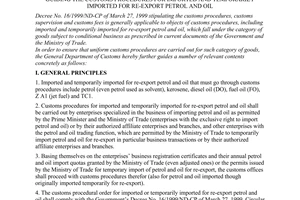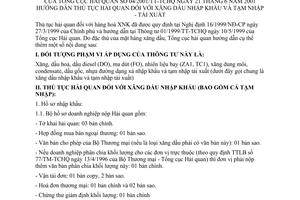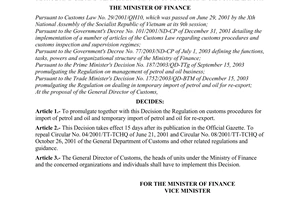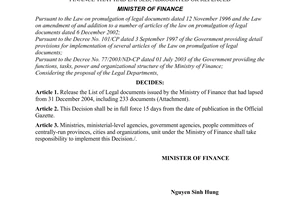Circular No. 04/2001/TT-TCHQ, guiding the customs procedures for imported and temporarily imported for re-export petrol and oil, promulgated by the General Department of Custom. đã được thay thế bởi Decision No.30/2004/QD-BTC of April 6, 2004 promulgating the regulation on customs procedures for import of petrol and oil and temporary import of petrol and oil for re-export và được áp dụng kể từ ngày 04/05/2004.
Nội dung toàn văn Circular No. 04/2001/TT-TCHQ, guiding the customs procedures for imported and temporarily imported for re-export petrol and oil, promulgated by the General Department of Custom.
|
THE
GENERAL DEPARTMENT OF CUSTOMS |
SOCIALIST
REPUBLIC OF VIET NAM |
|
No: 04/2001/TT-TCHQ |
Hanoi, June 21, 2001 |
CIRCULAR
GUIDING THE CUSTOMS PROCEDURES FOR IMPORTED AND TEMPORARILY IMPORTED FOR RE-EXPORT PETROL AND OIL
The customs procedures for export goods and import goods were prescribed in the Government’s Decree No. 16/1999/ND-CP of March 27, 1999 and guided in the General Department of Customs’ Circular No. 01/1999/TT-TCHQ of May 10, 1999. Due to particularities of petrol and oil commodity items, the General Department of Customs hereby additionally guides in detail a number of contents as follows:
I. Subject to this Circular are petrol, kerosene, diesel oil (DO), fuel oil (FO), jet fuel (ZA1, TC1), white spirit, condensate, base oil and oil tar, which are imported or temporarily imported for re-export (hereinafter referred collectively to as imported and temporarily imported for re-export petrol and oil).
II. CUSTOMS PROCEDURES FOR IMPORT PETROL AND OIL (INCLUDING THOSE TEMPORARILY IMPORTED)
1. Import dossiers:
1.1. Each dossier set to be submitted by an enterprise to the customs comprises:
- Customs declaration: 3 originals.
- Foreign trade contract: 1 duplicate.
- The Trade Ministry’s written permission (for petrol or oil categories that require such permission): 1 duplicate.
- If the enterprise divides its quota volume to its attached units (according to the provisions of Joint Circular No. 77/TM-TCHQ of April 13, 1996 of the Trade Ministry and the General Department of Customs), the concerned unit shall have to submit also the document on such volume division: 1 original.
- Bill of lading: 1 copy, 2 duplicates.
- Commercial invoice: 1 original, 2 duplicates.
- Volume expertise certificate: 1 original.
- Quality certificate (for petrol or oil categories on the list of goods subject to the State quality inspection): 1 original.
The duplicates of the above-specified papers shall be signed for certification by the director or person authorized by the director, who shall be held responsible before law therefor.
1.2. Papers produced by the enterprise to the customs:
- Foreign trade contract: the original.
- The Trade Ministry’s written permission for cases where the enterprise does not divide import volume to its attached units: the original (for comparison with duplicates).
1.3. The time limit for the enterprise to submit to the customs the above-specified documents:
The above-specified documents shall be submitted when the procedures for registering declarations are carried out, except for the following:
- The volume expertise certificate: Must be submitted within 8 working hours after the pumping of petrol or oil from transport means into depots or tanks is completed.
- Quality certificate: Must be submitted within 5 working days after the written declaration is registered.
- Commercial invoice: Must be submitted within 5 working days after the written declaration is registered. If the original is not yet available within this time limit, the enterprise may submit facsimile (of the original). The enterprise’s director (or deputy director) shall sign it for certification and be held responsible before law for the accuracy and truthfulness of such facsimile. In case of facsimile submission, the enterprise shall have to submit the original of the commercial invoice within 15 days after the written declaration is registered. In case of justifiable reasons, the director of the provincial/municipal Customs Department shall decide to extend such time limit.
Pending the availability of the above-said commercial invoice (the original or the facsimile thereof), the enterprise shall, upon submitting the written import goods declaration to the customs office, not have to declare tax calculation prices and payable tax amount in the declaration. As soon as it obtains the commercial invoice within the above-said time limit, the enterprise shall have to immediately make the tax calculation by itself on the customs declaration according to the provisions of law.
2. Time point for registering written declarations: Shall be the date the pumping of imported petrol or oil from transport means into depots or tanks starts.
3. Volume determination: Shall be based on the certificates of volume expertise made on ships by organizations with function of expertising petrol and oil.
4. Quality determination (for petrol and oil categories subject to the State quality inspection): Shall be based on quality certificates of the agency in charge of State inspection of petrol and oil quality.
5. Regulations on depots and tanks for containing import petrol and oil on the list of goods subject to the State quality inspection without quality standard certificates:
5.1. If the enterprise has empty depots and/or tanks, the imported petrol and oil shall be pumped thereinto. After the pumping is completed, the customs office shall seal up such depots and/or tanks. When the quality standard certificate is obtained, the customs office shall open the seal and complete the customs procedures as prescribed. For temporarily imported for re-export petrol and oil, the customs shall not require the quality standard certificate.
5.2. If the enterprise has no empty depots and/or tanks but pumps the imported petrol and oil into depots and/or tanks currently containing petrol or oil, the customs shall, after the pumping is completed, seal up such depots and/or tanks before the quality inspection result is available. If the State quality inspection agency determines that the imported petrol and oil volume is not up to the quality standards, the whole volume petrol and oil volume contained in such depots and tanks (including old and new ones) shall be handled according to the provisions of law, and the enterprise shall be fully responsible before law therefor.
5.3. For temporarily imported for re-export petrol and oil: If the enterprise wishes to pump imported petrol or oil into depots and/or tanks containing petrol or oil of the same category, it must have its import goods lot inspected and certified by the State inspection agency that such goods lot satisfies the quality requirements.
6. The procedures for switching the mode of petrol and oil temporary import for re-export to the mode of import for business:
6.1. Shall comply with the Trade Ministry’s Decision No. 0556/2000/QD-BTM of April 3, 2000.
6.2. If the quality standard certificate is not yet obtained when petrol or oil of categories subject to the State quality inspection is imported, the enterprise shall have to request the State petrol and oil quality inspection agency to conduct the inspection and submit the quality certificate to the customs office.
6.3. Customs procedures:
- The customs offices shall effect the deduction of the volume of goods permitted to be imported into the volume of temporarily imported goods, then calculate and collect import tax. Tax rate, tax calculation price, exchange rate for tax calculation and price difference collection shall apply upon the date of registering temporary import declaration and time limit for tax payment for the goods volume subject to such import mode switching strictly according to the current regulations on goods imported for business (30 days) after the temporary import declaration is registered. Enterprises that fail to pay tax within the prescribed time limit shall be fined for delayed payment and subject to other violation-handling measures strictly according to the current regulations.
- The tax payment time limit:
+ Enterprises shall have to fully pay tax before selling the imported petrol and/or oil volume.
+ In cases where the enterprise has paid tax for the imported goods volume which is now permitted for domestic sale, the customs office shall carry out the procedures for transferring money from temporary collection account to the State budget.
III. CUSTOMS PROCEDURES FOR RE-EXPORT PETROL AND OIL:
1. Re-export dossiers:
1.1. Each dossier set to be submitted by an enterprise to the customs offices comprises:
- Customs declaration: 3 originals.
- Customs declaration (of the temporarily imported goods lot): 1 duplicate.
- Purchase-sale contract: 1 duplicate.
- The Trade Ministry’s written permission (for petrol or oil categories that require such permission): 1 duplicate.
- If the enterprise divides its quota volume to its attached units (according to the provisions of Joint Circular No. 77/TM-TCHQ of April 13, 1996 of the Trade Ministry and the General Department of Customs), the concerned unit shall have to submit also the document on volume division: 1 original.
- Expertise certificate (for cases specified at Point 5.2 of Part III): 1 original.
1.2. Papers to be produced by the enterprise to the customs:
- Foreign trade contract: the original.
- The Trade Ministry’s written permission for cases where the enterprise does not divide its volume to its attached units: the original (for comparison with duplicates).
2. The enterprise shall be permitted to re-export petrol or oil taken from its depots and/or tanks containing only temporarily imported lot or another lot of petrol or oil of the same category.
3. Volume determination:
3.1. For petrol and oil re-exported by sea-going ships or riverway ships (riverways to Cambodia): The volume determination shall be based on the expertise certificates of the expertise agency with function of expertising petrol and oil.
3.2. For petrol and oil re-exported by tank trucks or cistern trailers through land-road border-gates: The volume determination shall be based on the gauges used when petrol or oil is pumped into tanks or cisterns. If gauges are not available, the goods owners shall request expertise, and the customs offices shall base themselves on expertise certificates to determine the volume.
3.3. For oil sold to export processing enterprises and supplied to sea-going ships, there must be gauges at both points where oil is pumped onto transport means and where it is pumped into tanks and/or cisterns of export processing enterprises or cargo-holds of ships.
3.4. Regarding volume gauges: Gauges must be inspected and recognized by the State standardization and measurement agency as standard ones. Gauges must be affixed with lead seals of the inspection agency and the customs office. Gauges must be periodically checked by the standardization and measurement agency as prescribed. These regulations shall not compulsorily apply to sea-going ships’ gauges.
4. Regulations on tanks and cisterns containing re-export petrol or oil through land-road border-gates:
- Transport vehicles must be registered with the customs offices where the declarations are registered for carrying out the re-export procedures.
- The state of tanks and cisterns on such vehicles must be checked by the customs offices before registration.
- Tanks and cisterns must be sealed as required by the customs offices.
5. Determination of categories:
5.1. The following cases shall be exempt from expertise:
- Re-export of petrol or oil taken from separate depots or tanks left intact with customs seals affixed thereon upon the temporary import.
- Re-export of ZA1, TC1 for airplanes (enterprises shall take responsibility therefor).
- Re-export of DO, FO (goods inspectors shall determine categories thereof by themselves).
5.2. The following cases shall be subject to the expertise:
- Re-export of petrol or oil taken from shared depots or tanks or from separate depots or tanks without customs seals (except for ZA1, TC1, DO and FO specified at Point 5.1 above).
- Re-export of ZA1, TC1 taken from shared depots or tanks by land roads, riverways or sea routes.
- If the petrol or oil is taken from the same depot or tank under the customs supervision, the expertise for category determination shall apply to the whole re-export lot, and separate determination for each ship or vehicle is not required.
6. Responsibilities of the customs offices carrying out the re-export procedures:
- To carry out the customs procedures for re-export goods lot according to regulations.
- To supervise the pumping of petrol or oil into transport means. After the pumping is completed, to seal up the cisterns, tanks or cargo-holds of transport means.
- In case of re-export through land-road or river border-gates, the customs shall:
+ Seal up dossiers, each comprising 2 declarations and 1 dossier reception bill, and hand them to the goods owners or their lawful representatives (hereinafter collectively referred to as goods owners). Even if the goods owners authorize ship or vehicle drivers in writing, such persons shall also be considered the goods owners’ lawful representatives. The dossiers shall subsequently be passed to export border-gate customs.
+ Hand each goods owner one delivery bill to serve as voucher en route.
+ Promptly notify the export border-gate customs of the export lot, identification number of transport means and other necessary information related to the re-export petrol or oil lot.
- The customs shall escort the lot when it deems necessary.
7. Responsibilities of goods owners: To ensure the conditions of goods with the customs seals and customs dossiers intact during the transportation to the export border-gates or export processing enterprises.
8. Responsibilities of customs offices of export border-gates (in cases where petrol and oil are exported through land-road or river border-gates) and export processing zones:
8.1. To receive and verify dossier sets forwarded by customs offices which carry out the re-export procedures.
8.2. To check seals on cargo-holds, depots and tanks, and in cases where they are intact:
- To supervise the goods export, ensuring that the whole goods volume is actually exported across the border, and to make certification of the actual export on the declaration and dossier reception bill.
- To seal up 1 declaration and 1 dossier reception bill, then hand them to the goods owner for submission to the customs for carrying of re-export procedures; to return to the goods owner 1 declaration; and to keep 1 dossier reception bill.
8.3. If they detect that the seals are no longer intact, the seals are fake, or have grounds to affirm changes in petrol or oil volume and/or categories, the export border-gate customs shall request the goods owners to demand volume and category expertise (particularly for DO and FO, category expertise is not required, but the customs offices shall bases themselves on reality to determine). If the expertise results show that the volume and category of re-export petrol or oil are consistent with those stated in dossier sets, they shall make written certification, seal up and proceed with procedures for exporting them through border-gates. If the expertise results confirm changes in volume and/or category, they shall make written record thereof and handle the case as prescribed.
8.4. When the means carrying re-export petrol and oil come back, the border-gate customs shall inspect such entry transport means as prescribed in order to detect smuggled goods or petrol and oil volume not actually re-exported and retained for domestic sale.
8.5. For oil re-exported to export processing enterprises: The customs offices managing such export processing enterprises shall supervise the pumping of oil into stores, depots and/or tanks of the export processing enterprises, check and determine the volume thereof by gauges.
8.6. For oil sold to sea-going ships in form of sea-going ship supplies: The border-gate customs shall have to carry out the re-export procedures and supervise the sale until the whole oil volume is delivered to ships.
9. Customs procedures for petrol and oil re-exported for airplanes:
9.1. Enterprises may apply the mode of single registration of declarations for multiple export as provided for in Decision No. 01/2001/QD-TCHQ of January 3, 2001. The valid duration of the declaration shall be compatible with the tax grace period for the temporarily imported goods lot.
9.2. Upon delivering goods to airplanes, enterprises shall have to:
- Produce the already registered customs declarations;
- Submit the sale invoices (or invoice-cum-delivery bills).
- Submit the goods orders placed by the flight crews’ captains or the airlines.
9.3. After each goods delivery shipment is completed, the customs shall give certification on the invoice and goods order and inscribe on monitoring bill (promulgated together with Decision No. 01/2001/QD-TCHQ of January 3, 2001).
9.4. In cases where a Vietnamese airplane does not make direct departure but flies to another domestic airport before its departure, the customs shall request petrol and/or oil selling enterprises to elaborate petrol and oil consumption norms for domestic flights and take responsibility before law therefor. Based on such norms, the customs shall affirm the actually re-exported petrol and oil volume calculated from the airport of departure (for example: If a petrol and oil volume of 100 tons is pumped at Noi Bai airport, and the fuel norm for each Noi Bai - Tan Son Nhat flight is 5 tons, the Noi Bai airport’s customs shall affirm the re-export petrol and oil volume of 95 tons).
9.5. Liquidation of declarations: Shall be made when the declarations’ customs validity expires, and then enterprises shall liquidate declarations by aggregating actually re-exported petrol and oil volumes in invoices and monitoring bills, and inscribe the actually re-exported volume in the declarations and gaps for actual re-export affirmation.
IV. ORGANIZATION OF IMPLEMENTATION:
1. This Circular takes effect 15 days after its signing. To annul Circular No. 05/2000/TT-TCHQ of September 26, 2000 and other documents of the General Department of Customs guiding this matter.
All acts of violating the provisions of this Circular and other provisions of law shall be handled according to the current law provisions.
2. The director of the Customs Supervision and Management Department shall have to assist the General Director of Customs in monitoring, inspecting, urging, directing and solving problems arising in the course of implementation of this Circular and reported by the provincial/municipal Customs Departments.
The heads of the departments and bureaus, the directors of the provincial/municipal Customs Departments and the concerned organizations and individuals shall have to implement this Circular.
|
|
FOR THE GENERAL DIRECTOR OF
CUSTOMS |




